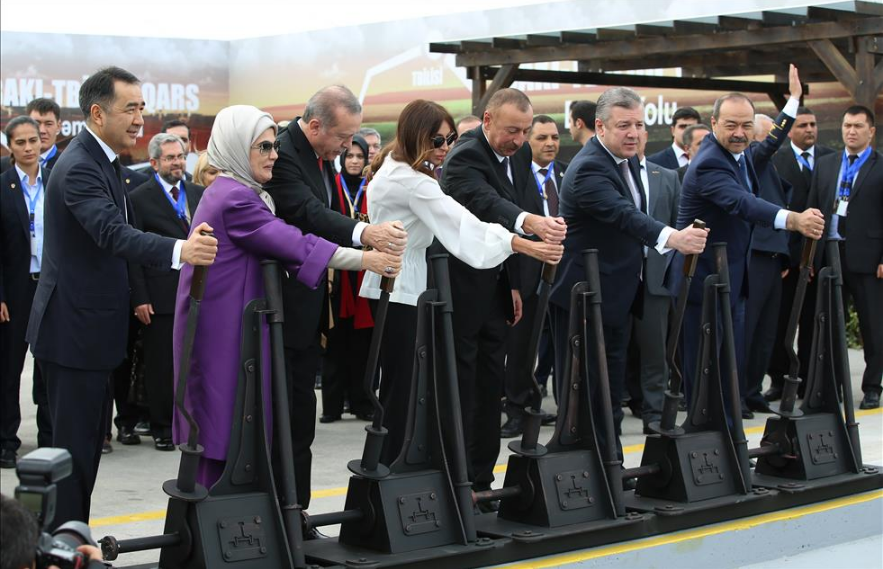A railway line linking Europe and Asia via the Caspian region and South Caucasus that is just over three months old is already showing its promise, and European officials are taking note.
In October, the Baku-Tbilisi-Kars (BTK) railway, linking the Caspian region’s Azerbaijan to Georgia and eastern Turkey, opened, giving a boost to and promising a new era in Eurasian trade.
"Azerbaijan is turning into a regional transport and logistics hub, and this is in the interest of the EU,” said Henrik Hololei, the European Commission's Director General for Mobility and Transport, at a press conference held at the Caspian European Club in Baku on Tuesday.
“The BTK connects Europe with Asia, shortens the distance and time for the delivery of goods; the EU wants to benefit from such new opportunities and harness the potential of new corridors, including the BTK,” Hololei said, according to Azerbaijan’s Trend news agency.
The BTK railroad was built thanks to an interstate agreement between Azerbaijan, Georgia and Turkey first discussed in 2007. Officials in all three countries had agreed to the project as a way to improve regional economic relations and attract foreign investment by connecting Europe and Asia, in an age when China is building the world’s largest global trade network, known as One Belt, One Road, or “OBOR” for short.
The BTK line measures just 846 km (526 mi), but spans three countries and acts as a land bridge at the crossroads of Asia and Europe. Goods can be moved from China to Europe in just 15 days, meaning the BTK contributes to a land route that is more than twice as fast as transportation by sea and less than half the price of air travel.
Trains that come to Azerbaijan’s Caspian seaports cross the sea by ferry after departing Kazakhstan, and begin their journey on tracks that cross through Georgia’s capital, Tbilisi, before reaching Kars in northeastern Turkey. There freight cars link up to the vast railway network of Turkey, which allows it moving further toward vital rail lines in Europe.
The volume of cargo expected to be transported via the BTK is based on a year-on-year growth projections, which put the line’s initial capacity between three and 6.5 million tons of cargo per year and the passenger count at about one million. By 2023, officials expect the level of freight to reach 17 million tons per year.
But some have even higher hopes for the line’s capacity and the economic potential of the region.
During a launch ceremony held in Baku in October, Turkey’s President Recep Tayyip Erdogan said the three host countries of the railway are hoping to lure 10 percent of the total 240 million tons of cargo that moves between China and Europe each year.
European officials like Mr. Hololei are expecting the BTK line to benefit trade balances both ways. During his remarks, Hololei noted that goods produced in Europe could be transported via the BTK route to not only Central Asia but South Asia as well.
China and Central Asian countries are among the major trade partners of the EU. Overall trade between the EU and Central Asian countries stood at €22.1 billion ($27.5 billion) in 2016, according to data compiled by the European Commission. China is the second biggest trade partner of the EU after the U.S., while the EU is China’s largest trading partner, with an average trade of €1 billion ($1.25 billion) per day.







 Russian Foreign Minister Sergei Lavrov has reasserted that Moscow has no intentions to stop the fighting in Ukraine, even if peace talks commence.
Russian Foreign Minister Sergei Lavrov has reasserted that Moscow has no intentions to stop the fighting in Ukraine, even if peace talks commence.
 Iran has refuted reports of alleged damage to Shimon Peres Negev Nuclear Research Centre located southeast of Dimona, Israel, during the recent air...
Iran has refuted reports of alleged damage to Shimon Peres Negev Nuclear Research Centre located southeast of Dimona, Israel, during the recent air...
 Iran and Pakistan have signed eight cooperation documents in various fields, and agreed to strengthen ties to fight terrorism in the region.
Iran and Pakistan have signed eight cooperation documents in various fields, and agreed to strengthen ties to fight terrorism in the region.



